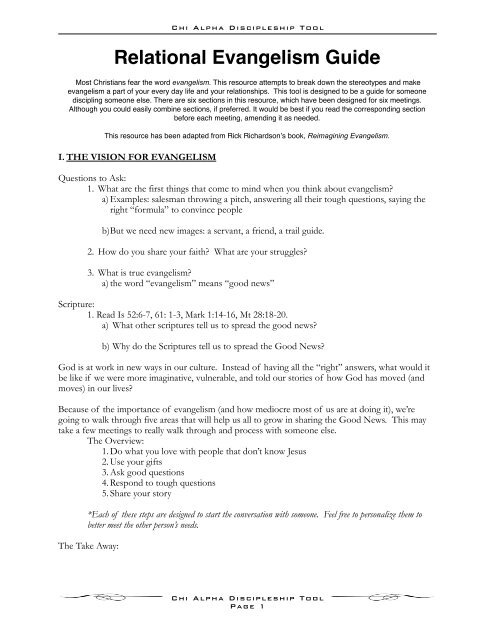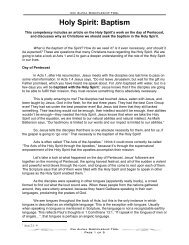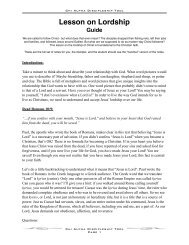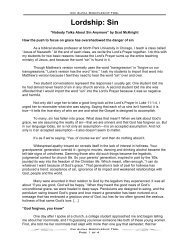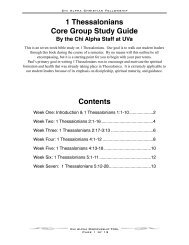Relational Evangelism Study - chi alpha @ uva
Relational Evangelism Study - chi alpha @ uva
Relational Evangelism Study - chi alpha @ uva
Create successful ePaper yourself
Turn your PDF publications into a flip-book with our unique Google optimized e-Paper software.
I. THE VISION FOR EVANGELISM<br />
Questions to Ask:<br />
1. What are the first things that come to mind when you think about evangelism?<br />
a) Examples: salesman throwing a pitch, answering all their tough questions, saying the<br />
right “formula” to convince people<br />
b)But we need new images: a servant, a friend, a trail guide.<br />
2. How do you share your faith? What are your struggles?<br />
3. What is true evangelism?<br />
a) the word “evangelism” means “good news”<br />
Scripture:<br />
1. Read Is 52:6-7, 61: 1-3, Mark 1:14-16, Mt 28:18-20.<br />
a) What other scriptures tell us to spread the good news?<br />
b) Why do the Scriptures tell us to spread the Good News?<br />
God is at work in new ways in our culture. Instead of having all the “right” answers, what would it<br />
be like if we were more imaginative, vulnerable, and told our stories of how God has moved (and<br />
moves) in our lives?<br />
Because of the importance of evangelism (and how mediocre most of us are at doing it), we’re<br />
going to walk through five areas that will help us all to grow in sharing the Good News. This may<br />
take a few meetings to really walk through and process with someone else.<br />
The Overview:<br />
1. Do what you love with people that don’t know Jesus<br />
2. Use your gifts<br />
3. Ask good questions<br />
4. Respond to tough questions<br />
5. Share your story<br />
*Each of these steps are designed to start the conversation with someone. Feel free to personalize them to<br />
better meet the other person’s needs.<br />
The Take Away:<br />
Chi Alpha Discipleship Tool<br />
<strong>Relational</strong> <strong>Evangelism</strong> Guide<br />
Most Christians fear the word evangelism. This resource attempts to break down the stereotypes and make<br />
evangelism a part of your every day life and your relationships. This tool is designed to be a guide for someone<br />
discipling someone else. There are six sections in this resource, which have been designed for six meetings.<br />
Although you could easily combine sections, if preferred. It would be best if you read the corresponding section<br />
before each meeting, amending it as needed.<br />
This resource has been adapted from Rick Richardson’s book, Reimagining <strong>Evangelism</strong>.<br />
Chi Alpha Discipleship Tool<br />
Page 1
Chi Alpha Discipleship Tool<br />
This person should have a Biblical vision of evangelism, and begin to be freed from the<br />
stereotypes associated with it. He/she should be excited about the opportunity we have to<br />
reach the world for Jesus, knowing that its the best rescue plan happening on earth!<br />
Possible Assignment:<br />
<strong>Study</strong> the Scriptures we mentioned and learn more about what the Bible says about<br />
evangelism.<br />
II. DO WHAT YOU LOVE<br />
“We assume evangelism is some separate activity that we do isolated from the rest of our lives. The<br />
truth is that evangelism begins naturally, by doing what we love to do.” - Rick Richardson in<br />
Reimagining <strong>Evangelism</strong>: Participant's Guide<br />
While it’s great to have close Christian friends, it’s good to have a balance of Christian and non-<br />
Christian friends because that’s what Jesus did.<br />
Scripture:<br />
1. Read Mk 2:15-17.<br />
a) What do you notice about Jesus?<br />
a) He was around non-Christians!<br />
b)So we also should be around non-Christians in order to share our lives and<br />
love for Christ.<br />
Questions to ask:<br />
2. What are some things that you love to during your free time?<br />
3. Who are some friends that are interested in these activities (especially non-Christians)? If<br />
no one comes to mind, how can you meet non-Christians who are interested in these<br />
activities?<br />
4. What would need to change in your schedule in order to have time to build relationships<br />
with people who don’t know Jesus? Do you have time for these types of relationships right<br />
now?<br />
Take Away:<br />
This person should realize that his God-given talents and interests are ways to reach non-<br />
Christians. He/she should brainstorm ways to begin developing relationships with non-<br />
Christians through these activities/interests. Pray with them and encourage them not to start<br />
something new, but do enjoyable things with purpose.<br />
Possible Assignment:<br />
Find an organization or activity that you enjoy and allows you to be around non-Christians.<br />
To do this, some activities (even “Christian” activities) may need to be cut out of your<br />
schedule.<br />
III.USE YOUR GIFTS<br />
Chi Alpha Discipleship Tool<br />
Page 2
Chi Alpha Discipleship Tool<br />
Take time to make sure that they’ve made steps to “do what they love” around non-Christians.<br />
Scripture:<br />
1. Read Romans 12:3-8, Ephesians 4:11-16.<br />
a) What do these scriptures mean?<br />
Often times when we think of evangelism, we see it as an individual initiative. We ask, “What can I<br />
do to reach this person?”, rather than thinking about how the larger Christian Body can reach that<br />
person. While God is concerned about what we’re each doing to reach out in our own life, He also<br />
desires that we reach out together.<br />
Questions to Ask:<br />
1. What are the benefits of working together as a community versus as an individual?<br />
2. What do you like to do, or feel that you are good at?<br />
a) Take a Spiritual Gift Inventory together to find one (or a few) gifts within which<br />
you operate regularly. One can be found on the resource page XAatUVA.com.<br />
b) Take time to process this with your core group member. Discuss the potential<br />
applications of their giftings.<br />
3. Why would God give us gifts?<br />
4. How can we foster their growth and development within us?<br />
Additional things to Discuss: What are the parallels between how our Heavenly Father receives our<br />
gifts of service for Him and His Kingdom? Below a few truths are listed for discussion. Afterwards,<br />
you should pray for one another.<br />
• He sees the heart – He takes DELIGHT in our gifts – He’s seeing the gifts, which He<br />
gave, grow and develop in us – Eph 2:8-10, 1 Cor 12:14-20, 27, Psalm 139:13-14, 1 Sam.<br />
16:7<br />
• In no way does He respond with criticism or disappointment – His response is always<br />
gracious, and loving – Rom 8:31-32, Isaiah 54:10, 1 Kings. 19:5-8<br />
• He treasures and rejoices over us – Zeph 3:17, Isaiah 49:15-16, Isaiah 62:4-5, Heb 12:2,<br />
Psalm 149:4, Romans 8:35-39<br />
• He is more interested in the process than the product (it’s about relationship; we’re being<br />
transformed by Him) – Phil 1:6, Phil 2:13, 2 Cor 3:18<br />
• He is extremely attentive to us, which shows His love for us – Psalm 139, Matt 6:25-34,<br />
Psalm 121<br />
• He’s so proud of us and who we’re becoming in Christ – Matt 3:16-17 (now we’re in<br />
Christ, we receive the Father’s affirmation through Christ), 1 John 3:1<br />
Take away:<br />
This person should be able to see the importance of working together as a community in<br />
evangelism, and see his/her unique giftings that should be used for that purpose.<br />
Chi Alpha Discipleship Tool<br />
Page 3
Chi Alpha Discipleship Tool<br />
Possible Assignment:<br />
Take the “Spiritual Gift Inventory” on XAatUVA.com, if you haven’t already. Discuss with<br />
someone else and get feedback on how to better use your gifts within community.<br />
V. ASK GOOD QUESTIONS<br />
Take time to see how they are processing their spiritual gifts. Go over any new results of the<br />
Spiritual Gift Inventory.<br />
One of the scariest parts of witnessing to friends and loved ones can be spiritual conversations. We<br />
don’t always know how to bring up spiritual topics with friends. We don’t want to be inauthentic,<br />
but we know we need to be intentional. So how do we start spiritual conversations?<br />
Questions to Ask:<br />
1. Why do you think it’s difficult to bring up spiritual conversations? Is it difficult for you?<br />
Why?<br />
2. What could someone say or do that makes it more comfortable for you to share your personal<br />
thoughts, emotions, or spiritual experiences with them?<br />
Here are some examples of spiritual questions you could ask others:<br />
• Have you ever felt like you received a sign from God? What would you do if God gave<br />
you a sign?<br />
• What is the most significant thing that has happened to you in the last month?<br />
• What is your take on this whole God question? What do you think God is like? How<br />
has it changed since you have been in college?<br />
• What do you think is wrong with Christians today?<br />
• What do you think life is about? Do you think you have a destiny?<br />
• Have you ever had a spiritual experience? Would you like to have one?<br />
While it may seem difficult to bring up these questions, opportunities are more common than you<br />
might think. Pray that God will give you discernment, and then begin to pay attention to where<br />
God might be moving in your friends’ lives.<br />
Take Away:<br />
This person should be willing to start spiritual conversations, and have a few ideas of how to<br />
start conversation.<br />
Possible Assignment:<br />
With someone who you are already comfortable with (a friend), begin a spiritual<br />
conversation with one of the above questions. See where it goes. You only get better with<br />
spiritual conversation with experience!<br />
IV. RESPOND TO TOUGH QUESTIONS<br />
Take time to ask if they had any spiritual conversations since your last meeting. Ask how they went.<br />
Chi Alpha Discipleship Tool<br />
Page 4
Chi Alpha Discipleship Tool<br />
Richardson addresses the need to respond to tough questions in Reimagining <strong>Evangelism</strong>. He says<br />
that we need to learn to respond by rebuilding trust with people and by speaking truth.<br />
Often times people don’t consciously know what questions they have about Christianity. So in order<br />
to help, we have to help them unpack them by asking good questions. Not only do we get to the source<br />
of the issues, we also get to know people better.<br />
Scripture:<br />
1. Read Col 4:2-6<br />
a) What does this passage say?<br />
b) How does this apply to us?<br />
2. Read John 4:4-30, 29-42:<br />
a) What questions does she ask?<br />
b) What were the trust issues underlying her questions?<br />
c) How does Jesus respond?<br />
d) What do you learn from His response?<br />
Questions to Ask:<br />
1. When someone asks you a tough questions (such as, Why would a good God send people<br />
to hell?), what’s the inner dialogue saying in your head?<br />
2. Why do you think we may be afraid of tough questions, and even wish them away?<br />
3. Why might it be more important to identify the trust issue behind the question, rather<br />
than just answer the question as asked?<br />
Some key things to remember when responding to a tough question:<br />
• Be sensitive to the Holy Spirit- Pray for wisdom while you think of how to respond.<br />
• Affirm the validity of their question.<br />
• Don’t respond right away with logic - ask them why they are asking. It may be a deeper issue<br />
than their surface level question. Tough questions are often trust questions.<br />
• Address the trust question. Apologize for other’s actions or the person’s experience if it was a<br />
bad one.<br />
• Speak truth if it’s needed. If you don’t know, say “I don’t know.” That’s okay!<br />
• Challenge them to give God a chance, and use scripture if you can.<br />
• Don’t go by a script or by what you think you HAVE to say. Remember that it’s a person<br />
you’re talking to, so be natural!<br />
If you’d like more examples of how to respond to tough questions (i.e. scenarios), talk to the staff about more<br />
resources.<br />
Take Away:<br />
This person should be more confident with answering tough questions, and be able to<br />
identify possible trust issues behind them.<br />
Possible Assignment:<br />
Chi Alpha Discipleship Tool<br />
Page 5
Chi Alpha Discipleship Tool<br />
Ask a trusted friend to ask you some of their tough questions about God or Christianity.<br />
Use the skills you’ve learned to affirm them, identify any trust issues, and, if necessary,<br />
respond in truth.<br />
V. SHARE YOUR STORY<br />
Take time to ask them how their conversations went with a friend since their last meeting.<br />
The most important thing that you have is your story. Your “story” is the story of how God has<br />
moved in your life. What are the things He has done in your life? Sometimes we feel like we don’t<br />
have much to share and that our lives are boring. This is not the case!<br />
Your “story” is not just a conversion story, although it will include your conversion. But it also<br />
includes the seasons or times that you’ve experienced transformation. Maybe you’ve experienced<br />
spiritual change in the way you see yourself, interact with others, prioritize things in your life, etc.<br />
Your story includes times that you’ve experienced or encountered God. You may still be a work in<br />
process, but you’re seeing change in your life.<br />
Overall, your spiritual journey (or your “story”) is a series of transformations. These encounters are<br />
to be shared with those around you.<br />
Questions to Ask:<br />
1. Where do we see transformation stories in the Bible? Discuss one or two.<br />
a) Examples: The apostle Peter, Saul/Paul, David<br />
2.What is a time in your life that would be a transformation story?<br />
3. Have you ever shared this transformation story with others? When and how?<br />
4. How comfortable are you sharing this story with others?<br />
Go through the “Sharing Your Story” resource on the resource page at XAatUVA.com.<br />
Take Away:<br />
This person should be able to identify transformation stories in his/her life, and be willing<br />
and able to share them with others.<br />
Possible Assignment:<br />
Spend time developing and sharing your story with others. Go through the “Sharing Your<br />
Story” resource on XAatUVA.com.<br />
Chi Alpha Discipleship Tool<br />
Page 6


